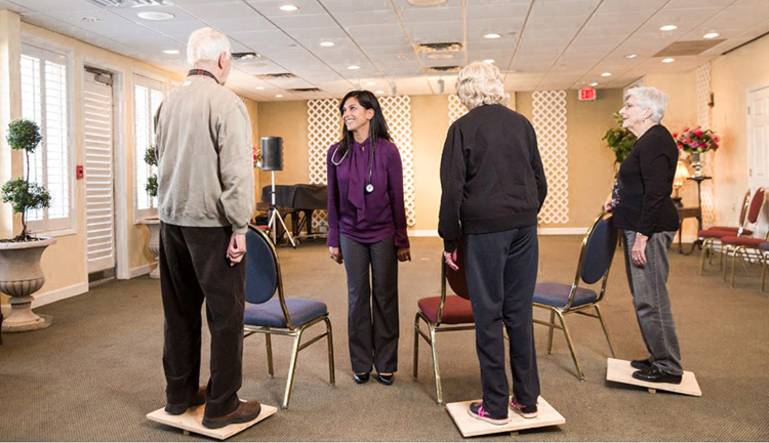Alzheimer’s and other forms of dementia cause many changes to an older adult’s mental and physical health. While some are widely known, such as memory loss and a tendency to wander, others aren’t. One of the lesser-known challenges for people with dementia is problems with balance.
Because of the damage the disease causes to the brain, older adults with dementia may experience changes in gait. Their balance may become impaired, putting them at higher risk for a fall.
What can you do to help an older adult stay steadier on their feet?
We have some suggestions for you to explore and discuss with their primary care physician.
Activities That Help Improve Balance among Older Adults
Exercise in general can keep seniors flexible and strong. This is essential for lowering the risk of falls. A combination of strength training, stretching, and stamina-building exercise are believed to be best.
A few senior-friendly forms of exercise to explore with your loved one might include:
- Restorative yoga: Yoga helps build core strength and overall flexibility. While many people associate yoga with complicated maneuvers performed on the floor, there are other methods. Chair yoga can be as effective and safer for those with mobility challenges.
- Walking: Most people know walking is good for heart health, but it does more than strengthen your heart. It also builds bone mass and reduces stress. It’s that mind-body connection that makes walking an ideal activity for adults with dementia.
- Tai Chi: The slow, steady movements that comprise Tai Chi make this ancient Chinese exercise a good choice for adults with dementia. Not only will it aid in building balance, stamina, and core strength, but it also promotes better sleep. People with Alzheimer’s and dementia often struggle getting to and staying asleep.
- Water aerobics: Aquatic forms of fitness can also improve balance and strength for senior loved ones who haven’t developed a fear of water, which is common among people with dementia. Like Tai Chi, water exercises also promote a better night’s rest. Many fitness centers and YMCA organizations host water aerobics classes specifically for older adults.
- Light weight training: Small hand weights or resistance bands can also increase an older adult’s core strength. Research shows repetition is the key to creating a stronger body during retirement years. SilverSneakers, a fitness program for older adults, has some helpful information on strength training for seniors.
One final tip to consider is working with an occupational therapist. These health professionals can identify ways to work around a senior with dementia’s unique physical deficits. For example, if they struggle to reach up or kneel down to get belongings off a shelf, an occupational therapist can assist the older adult in overcoming this.
Alzheimer’s Care Resources
If you are a caregiver for a loved one with Alzheimer’s, you may be interested in reading more about topics ranging from protecting dignity to improving nutrition. Our resources for families explore these topics and more.
We also invite you to tour a Five Star Senior Living memory care program near you. Contact us to schedule a time or learn more.

